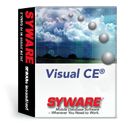Macros and Events

Visual
CE® Personal and Professional Editions Editions have a Macro Programming
capability.
A Macro
Program is defined as a sequence of commands that are executed,
one at a time. Macro Programs are invoked when (a) the user clicks
a button on the form, or (b) an event occurs (such as a value
changed or a control gets or loses focus), or (c) the user
selects an item on a custom menu.
Each command step in a macro can do one of many things:
Menu Command
Performs a menu command from within a macro program. Any menu
command can be handled this way.
Run External
Starts some other Windows CE application. A value from the current
record can be sent as a command line parameter.
Report CE®
Launches Report CE and generates a report about the record currently
being shown by Visual CE.
Move to Region
Forms can be larger than the physical screen on the device. This
allows you to move from one region of the form to another.
Jump
Launches another Visual CE form and positions to a related record
in that form.
Message/Beep/Sound
Puts up a message box on the screen with a message you specify, plays a system sound, or plays a pre-recorded sound.
Assign
Assigns a value to a column or global variable. The value can
be an expression (the same type of expression that you specify
in a calculated control).
Skip
Skips forwards or backwards in the Macro Program. You specify
a specific place in the macro to go to. Alternatively, you
specify the number of commands you want to skip (positive
values skip forward, negative values skip backwards) as an
expression (the same type of expression that you specify in
a calculated control). An if...then...else can be used to
control where to skip to (the condition can depend on the
current values in the record).
GPS
Reads a NMEA GPS signal into a column of the table or a global
variable.
Serial I/O
Allows to open a serial port, read and/or write characters to
it, and close the serial port.
File I/O
Allows to open a text file, read and/or write characters to
it, and close the text file.
mEnable
Turns an mEnable connection on or off, synchronize the handheld
over a wireless network, or get/put files on the mEnable server.
Import/Export
Import/Export of text files or XML files.
Sleep
Delays the execution of a Macro Program for a specified number
of seconds.
Change sort/search order
Changes the order of the records in the database.
Set Alarm
Sets an alarm to launch a form at a later date/time.
Set Timer
Sets n timer to run a macro at a later date/time.
SMS
Sends an SMS text message or opens a form when an SMS message is received.
Run a sub-macro
Run another macro and then continue with this one.
Show/Hide control
Show or hide a control.
Set focus
Set focus on a control.
Dial
Dial a phone.
Grid
Control the selected line in a grid.
Message Box
Display a message box.
Select Tab
Control the tab that is selected.
Things
you can do with Macro Programming:
-
If you are building a questionaire, you can have a button that
sets a checkmark (for example, gender) and then moves to the next
appropriate set of questions.
| Assign
"Male" to Gender |
| Move
to region with "Male" questions |
| Return from macro |
-
You can add integrity constraints: test to make sure a value is
in range and if not, display an error:
| Skip
button: if age >= 0 go to Continue |
| Put up an error message |
| Return from macro |
| Continue: |
| Save the record |
| Return from macro |
- You can add an event to a dropdown that gets triggred when the value in the dropdown changes. If you have a "Gender" dropdown, this could be used to hide/show a "Pregnant?" checkbox:
| Skip button: if Gender = 'Male' then 2 else 0 |
| Show "Pregnant?" checkbox |
| Return from macro |
| Hide "Pregnant?" checkbox |
| Return from macro |
Bear in mind that this is a macro capability that is running on
a handheld device. If you need to do significant record processing,
it would be better to do this using some other tool on the desktop.
Macro Debugger
Visual CE includes a macro debugger. The macro debugger will
allow you to see, on the desktop, the steps of a macro running
on the handheld. The debugger will let you stop the macro
while it is running; view the macro steps, column values, or
variables; and then start the macro running again.
Events
Events are generally (but not always) actions initiated by the user.
You can associate a macro with ane vent, so that when the event
occurs, the macro runs automatically.
Visual CE supports the following events:
Focus
A control gets/loses input focus.
Changed
The value in a control was changed by the user.
Up / Down / Left / Right
The user pressed the up/down/left/right button.
Action
The user pressed the "action" button.
Hardware Button
The user pressed a hardware button.
Record Display
The form is moved to a record.
Leave Record
The form is moved from a record.
Startup
The form is starting.
Rotate
The screen is rotating.
Select Tab
The selected tab has changed.
